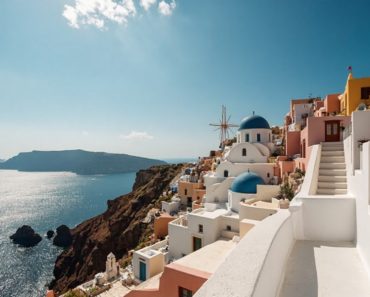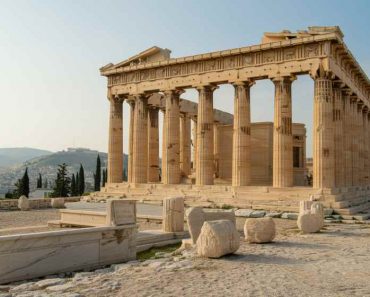Published on
October 5, 2025
Elafonisos Island, in the Laconia region of Greece, has taken a major step towards adopting green tourism by opening its first municipal Waste Transfer Station (WTS). The station is an integral part of the island’s overall strategy for sustainable development and is designed to eliminate waste build-up and promote correct waste management for the island’s increasing tourism industry.
Elafonisos, with more than 200,000 annual visitors, has struggled to cope with the waste created by its successful tourist sector. To resolve this, the local authority, in partnership with different stakeholders, has invested in the Waste Transfer Station, which ensures that all solid waste is routed to the Skala waste treatment plant, mitigating risks of contamination and supporting a cleaner, greener environment for locals and tourists alike.
Waste Management and Sustainability: Key Pillars of Green Tourism
The launch of the Waste Transfer Station is a testament to Elafonisos’ commitment to green tourism. By addressing the growing issue of waste management, the island is not only improving its environmental footprint but also setting a sustainable example for other tourism destinations in Greece and beyond. The new facility helps streamline the island’s waste disposal processes, ensuring that waste is handled in a way that preserves the natural beauty of the island and supports the growing demand for eco-friendly travel.
Furthermore, Elafonisos has worked to reduce light pollution and increase recycling efforts, aligning with broader goals to make the island a sustainable tourism destination. The use of recyclable materials, solar energy, and eco-friendly construction in the tourism infrastructure aligns with global sustainability standards, offering visitors the opportunity to explore the island while supporting its green tourism vision.
Circular Economy and Recycling Initiatives: The Heart of Green Tourism
Building on its environmental initiatives, Elafonisos is actively involved in the “Green Island” program of the South Aegean Solid Waste Management Authority (FODSA), which promotes recycling and circular economy practices. The island’s sustainability efforts aim to reduce waste by promoting reusable resources, composting, and waste reduction practices in both residential and tourist areas.
The Just Go Zero program encourages both residents and tourists to actively participate in waste management and recycling, fostering a sense of community responsibility and engagement in the island’s sustainable future. These efforts to promote recycling and circular economy practices align with the growing trend of eco-conscious travel, where travelers are encouraged to leave a minimal environmental impact on the places they visit.
Green Infrastructure Projects: Building a Sustainable Future for Elafonisos
In addition to the Waste Transfer Station, Elafonisos is investing in green infrastructure to further its goal of becoming a leading sustainable tourism destination. The island is planning the construction of a €4 million wastewater treatment plant, designed in collaboration with the Region of Peloponnese, to ensure the sustainable management of the island’s water resources. This plant will help reduce the impact of tourism on the local water supply, supporting sustainable practices in water usage.
Other infrastructure projects include a new desalination system using double osmosis technology, which will allow the island to sustainably manage its freshwater resources for both local consumption and tourism needs. These efforts ensure that Elafonisos remains a model of eco-friendly tourism and sustainable living.
Sustainable Tourism: The Impact on Local Communities and the Environment
The commitment to green tourism has had a positive impact on local communities in Elafonisos. By adopting eco-friendly practices and sustainable development policies, the island is able to preserve its natural resources while simultaneously benefiting its residents. The sustainable tourism infrastructure helps create new job opportunities in green jobs, such as waste management, eco-tourism guides, and environmental education.
Moreover, the island’s local businesses have embraced sustainable practices, from solar-powered accommodation to eco-friendly transport and local, organic dining. This collaboration between government bodies, businesses, and residents fosters a community-driven approach to sustainability, ensuring that tourism growth supports both the environment and the island’s economy.
Elafonisos: A Green Tourism Destination for Eco-Conscious Travelers
Elafonisos has become a must-visit destination for eco-conscious travelers seeking a cleaner, greener vacation experience. The island’s commitment to sustainability, recycling, and environmental conservation makes it an ideal location for those looking to explore nature without leaving a negative environmental footprint. The focus on eco-friendly hotels, local organic food, and guided nature tours ensures that tourists can enjoy the island’s natural beauty while also supporting sustainable tourism practices.
As more travelers prioritize eco-tourism and green destinations, Elafonisos is well-positioned to attract eco-conscious tourists from around the world. With its growing green tourism infrastructure and strong commitment to environmental preservation, the island is shaping the future of sustainable travel in Greece and setting a positive example for other destinations in the Mediterranean and beyond.
Collaboration for a Sustainable Future: Working Toward a Green Economy
The collaboration between local authorities, the private sector, and tourism stakeholders is crucial for the success of green tourism in Elafonisos. By working together, these groups ensure that the island’s tourism growth is in line with its sustainability goals, supporting a cleaner, greener future for both residents and visitors.
The introduction of environmental policies, sustainability campaigns, and green initiatives in the tourism sector has positioned Elafonisos as a model destination for sustainable tourism in Greece. The successful integration of circular economy principles, eco-friendly infrastructure, and environmental stewardship will continue to shape the island as a leading eco-tourism destination in Europe.
Elafonisos Island—A Model of Sustainable and Green Tourism in Greece
Greek Elafonisos Island is leading by example in green tourism with its Waste Transfer Station, circular economy strategies, and green infrastructure projects. The island is adopting sustainable tourism to ensure that it is able to sustain itself as a world leader in tourism as well as maintain its natural beauty and cultural heritage.
With its sustainability, community-based, and nature-conservation focus, Elafonisos stands poised to pioneer eco-tourism in the Mediterranean. With increasing tourism in the region, the island will continue to encourage visitors to discover responsibly and make a contribution towards the continued conservation of the earth’s natural resources.







